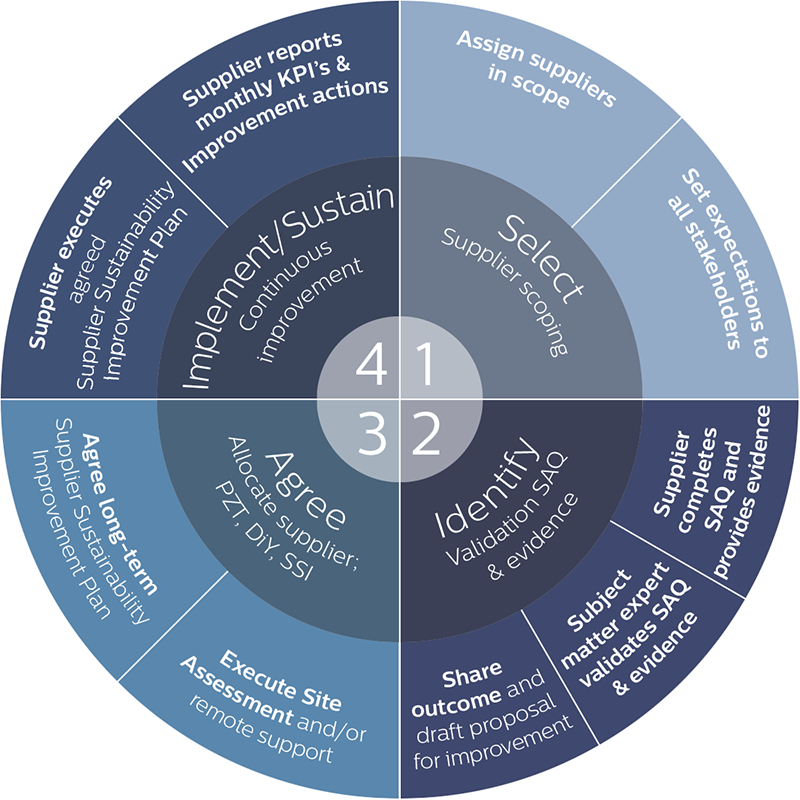Philips Drives Supply Chain Sustainability “Beyond the Audit”
Imagine conducting a job interview and only asking potential candidates to discuss the ways in which they were not qualified for the position. How forthcoming could you reasonably expect these individuals to be? With their livelihoods on the line, even the most honorable job seekers are likely to stretch the truth to make themselves appear more suitable. Now imagine, as the hiring authority, you have no ability to fact check or verify the candidates’ purported experience. The scenario is a recipe for failure. Though you might argue that no one in their right mind would ever operate in such a self-defeating manner, the reality is this is essentially how many organizations have approached their supply chain sustainability initiatives — define sustainability criteria, compel suppliers to complete a checklist defining their compliance, or lack thereof, with said criteria and then make sourcing decisions based on these largely unsubstantiated reports.
This “methodology” might suffice for those organizations whose primary goal is to appear to be sustainably minded, but not for companies like Royal Philips NV (Philips), which continues to raise the bar for sustainability within it own operations, its products/solutions and its supply chain ecosystem with programs like “Healthy People, Sustainable Planet,” and a corporate vision to “improve the lives of three billion people a year by 2025.”
In a recent presentation at the ELEVATE Leadership Series in New York, Marcel Jacobs, director, supplier sustainability for Philips discussed the company’s sustainability journey (see Milestones infobox), and the innovative new supply chain sustainability initiatives Philips is implementing in order to motivate the higher levels of supplier engagement needed to achieve the structural impacts it aims to generate within the value chain.
After an extensive analysis of the audit process, Philips’s responsibilities, the suppliers’ responsibilities, a series of external stakeholder surveys and discussions with different environmental organizations, the conclusion was unequivocal: auditing was not stimulating the structural improvement in the supply base that Philips needed to reach its ambitious goals. “We found that some suppliers have a quick-fix mentality and they may try to cover up things that they believe might compromise their business with us,” said Jacobs.
This finding is also independently supported by Stanford University professors Erica L. Plambeck and Terry A. Taylor in their 2015 paper: “Supplier Evasion of a Buyer’s Audit: Implications for Motivating Supplier Social and Environmental Responsibility.” Taylor and Plambeck identified an effect known as a “backfiring condition,” which occurs when actions, such as audits, designed to motivate suppliers to be more socially and environmentally responsible trigger greater emphasis on passing the buyer’s audit by hiding information as opposed to doing the work required to be more socially or environmentally responsible.
A more recent study performed by Sheffield University Political Economy Research Institute in 2016 further confirms that sustainability audits may not only be ineffective in detecting or correcting labor and environmental problems in global supply chains, but they may actually reinforce “endemic problems in supply chains.”
According to research, audits give the impression of active supply chain monitoring and continuous improvement, but actually reinforce a pattern of hiding problems.
The report, Ethical Audits and the Supply Chains of Global Corporations, asserts that labor abuses, poor working conditions and environmental degradation remain widespread within global supply chains because “audits give the impression of active supply chain monitoring and continuous improvement,” but actually serve as “a means of fostering a checklist compliance approach” to sustainability and reinforcing “a pattern of hiding problems.”
Recognizing this Achilles Heel in the audit process, Jacobs and his team developed a new Supplier Sustainability Performance (SSP) program replacing the “us vs. them” audit mentality with a collaborative approach that focuses on enabling clear, frequent and honest communications; capacity building and incentives to promote continuous improvement and common business goals.
“If we want to increase transparency, we need to have everything on the table. So, the first thing we tell suppliers is that they will not be penalized for not meeting the code. We understand that a lot of our smaller suppliers do not have the dedicated resources available to manage these kinds of initiatives,” Jacobs explained. “So, we keep reinforcing to them that they need to be open and honest with us, so we can help them, and provide the guidance and tools they need to make the improvements that will not only benefit our business, but theirs as well.”
While Philips has committed to supporting suppliers as they work to improve, the company has also set a very firm boundary. “If a supplier is not willing to mitigate zero tolerances, or if they try to fool us, then they will lose the opportunity to win new business with us,” Jacobs said. “It’s very simple, if they are not willing to make a commitment to us, then we are not willing to commit business to them. Of course, if it is a sole-source component or a very strategic part we cannot just drop them, but we make it clear that we will only maintain business for as long as we need that product, no new business will be allocated to them.”
“Philips has opted to focus on three key issues defined by stakeholders in the technology sector: health and safety, worker remuneration and benefits and workforce turnover.”
To keep the program manageable for its supply base, Philips has opted to focus on three key issues defined by stakeholders in the technology sector: health and safety, worker remuneration and benefits and workforce turnover. To set a baseline, each supplier in scope is asked to complete a Supplier Sustainability Declaration, a self-assessment form (See SSD infobox), which outlines current sustainability maturity in terms of site-level organization, quality, environment, health and safety, business ethics and human capital. For each category, suppliers are required to provide up to 200 pieces of “evidence” on how they have identified their materiality and implemented sustainability in relation to these core aspects within their own operations. This supporting evidence may include definition of key performance indicators, target settings, meeting minutes, job descriptions, procedures, certifications and payment terms.
Once the self-assessment is complete and all supporting documents are submitted, Philips will then validate the materials, identify potential zero tolerances (aka unacceptable violations) around child/forced labor, fake/falsified records, immediate threat to the environment or workers and non-compliance to product regulations or verified worker income requirements; and classify suppliers: BiC (Best in Class); DIY (Do It Yourself) suppliers that are aware, capable and can be remotely guided and supported and SSI (Supplier Sustainability Improvement), the most promising and impactful group of suppliers with whom Philips engages most closely with on-site assessments, remote support, peer-to-peer networking, long-term corrective action plans, training and development (30 percent of the company’s total suppliers).

Philips Supplier Sustainability Program Execution Wheel
Jacobs noted that Philips began implementing this new assessment program in July 2016 with approximately 100 Chinese suppliers. The cohort was expanded to 300 in 2017 to include suppliers in Europe, India, Indonesia, Brazil and Mexico. Each year, additional suppliers will be invited into the program.
Though still early in the program’s implementation, Jacobs noted that he is already seeing a difference in the attitude of suppliers. “Traditionally, when we did audits, we would get push back on scheduling audits etc. with the new approach, we actually see that suppliers are taking the relationship more seriously. They are much more open with us and are disclosing more areas for improvement than it would be possible to identify through an audit only.”
Related Resources
- Program Overview: Philips Supplier Sustainability Performance
- Forbes Article: Do Supply Chain Audits Work? Dealing With Deviant Suppliers Like A Journalist
- Blog: Are we on the cusp of a new economic revolution?
